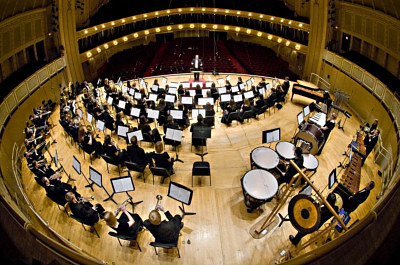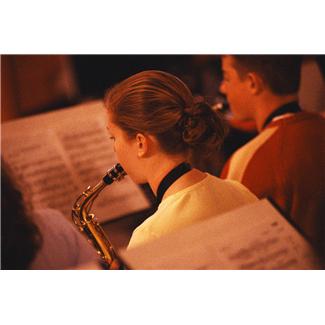
In the last post, we observed that many musicians, including many of the highest caliber, teach to supplement their performance activities. So if you decide you want to teach (whether as the whole or part of your musical activities), what does that say in terms of our initial question of whether to pursue a degree in music?
For any music teaching job, even if you’re self-employed, it is at least advisable to have a degree in music —but the specific necessities (how many degrees and what kind) depend upon what kind of teaching you’re considering.
Collegiate performance
If you want to teach music performance at the college level, you need the chops and experience of a top-flight performer, as well as music degrees extending through a doctorate (DMA), though I have known people who started teaching at a community college with only a master’s degree.
So if you’re aiming for a collegiate teaching career, do you want to get degrees in music performance or music education? That’s a good question. College-level job descriptions differ one to another, and different schools will be looking for and open to different things in a candidate. So my advice is to follow your interests in forming your own personalized “package” to offer to prospective employers. Generally speaking, music education degrees/concentrations are particularly valuable for those who would want to teach pedagogy (that is, teaching students how to teach their instrument). But bear in mind that many colleges want someone who will teach both performance and pedagogy.
For those with a particular yen for performance, the nice thing about a collegiate position is that it very often comes with the expectation that you will remain active as a performer; so you get to perform on your own terms because your stability is coming from the college job, while at the same time the teaching responsibilities also keep your chops in shape as you remain abreast of your students’ repertoire. Do be advised that the administrative work entailed in a college job can be heavy, so keep that in mind when deciding whether to pursue teaching in higher education (and this, too, varies from school to school).

Public school
If you desire to teach in a public school, you will need at least an undergraduate music degree in performance or education, as well as teacher certification. You should enjoy working with kids and be aware that, particularly in string programs, the level can be quite elementary. There are a wide variety of options in public school music teaching: general elementary, general secondary, elementary/secondary/high school strings/band/choir, and each require different skills, especially when it comes to relating to various age groups. This is also the area in which the majority of music majors find themselves. According to one reviewer of the post, those aspiring to such positions should be aware that the market is shrinking rapidly. Public schools are beginning to cut their arts programs in favor of giving more time to “core” subjects, and it is becoming harder and harder to obtain a full time job right out of college. One may have to be content with substitute teaching for a few years before receiving one’s “break.”
Private teaching
For private teaching, it is similarly advisable to have at least an undergraduate music degree in performance or education. If you enjoy working with beginning students, the field is somewhat less competitive (depending on where you live), but it becomes increasingly more competitive as you seek to work with more and more advanced students. Bear in mind that if private teaching is the totality of your income, you will need to take on quite a number of students, which often means that teaching takes precedence over performing. This is agreeable to many; to others it is not.
Summary
In short, anyone who is considering a degree in musical performance should ask, “Am I reasonably on my way to attaining the skill of a concert artist?” Realistically, that generally means being able to handle the most challenging mainstream repertoire for your instrument with reasonable command by the end of high school (it’s a bit of a different story for singers). If that’s not where you find yourself, then I would consider a performance degree only if, on the one hand, you plan to go into pre-collegiate music education (in which case a music education degree might actually be more useful) or, on the other hand, if you plan on pursuing subsequent graduate study in a field like music therapy or arts administration. If that’s not you either, then I would not pursue a performance degree, at least not as your only one — even if you can get into a performance-track degree program somewhere (since, to be painfully frank, if you’re intent on finding a college that will take your money to give you a performance degree, I can pretty much guarantee you’ll find one. That is not — let me repeat, that is not a guarantee of a successful performance career).
To be concluded in Part 4 . . .
Benjamin Shute is Visiting Assistant Professor of Violin at Dickinson College. A native of Wilmington, Delaware, he studied at the New England Conservatory (Boston) and the Hochschule für Musik Freiburg (Germany). He enjoys sharing the echoes of the gospel in music in a variety of settings, performing frequently as recitalist and chamber musician, serving periodically as concertmaster of the Boston Chamber Orchestra, and teaching at the Csehy Summer School of Music and other festivals in Europe and Asia. He is a regular contributor to the Center for Gospel Culture.

Leave a Reply